John Perich: So what was with the trend of hyperviolent 80s action movies with rock ballads over the closing credits? First Blood Part II (a/k/a, Rambo wins Vietnam) is probably the high point of the genre.
But you can find similar examples in Commando, in Bloodsport, and others.
Why were these there? Given the brutality of the films they capped off, isn’t it a little jarring to have a soulful reflection on peace and hope?
My guess is that it’s a stylistic choice to humanize the protagonist. In Commando, for instance, Schwarzenegger has just murdered an island full of people, some of them in pretty grisly ways. So when Power Station’s “Fight for Love” comes on, it’s to remind the audience, none too subtly, that the bad guys who shoot people are bad, but the good guy who shoots people is good. Otherwise we’re just reveling in violence for its own sake!
Or maybe it’s just the post-workout cooldown? After you’ve gotten amped watching Stallone or Schwarzenegger blow up helicopters for 110 minutes, you need something slow to restore your heart rate to a normal level. Otherwise, you’ll charge out of the theater and slay the nearest authority figure you see.
Jordan Stokes: There is a boring economic explanation for this – or partial explanation, rather. Filmmakers in the 80s had to deal with a double bind. On the one hand, there was this aesthetic of HUGENESS: just look at Stallone next to a 70s action star like Clint Eastwood, right? (And they’re all post-Jaws, so blockbusters are a thing now.) On the other hand, the Hollywood studio system is well and truly dead. So how are you going to finance your HUGE blockbuster?
One answer: by putting lots of music on the soundtrack. This probably sounds like crazy-talk in this day and age, where the licensing fees for putting a song in a film are one of the few ways that bands can still get rich. But as I understand it, in the 80s, the economic incentives ran in reverse. One stream of financing for a lot of movies was provided by the big record labels, who would pay for the privilege of putting their songs in the film in exchange for a percentage of the soundtrack album. (The Weinsteins were apparently really good at this maneuver, and in some cases managed to get the record labels to completely underwrite the production.)
So the useful takeaways for this discussion:
- Soundtrack albums were a bigger deal in the 80s than seems reasonable by modern standards
- Decisions about what to put on a soundtrack album are not artistically driven. Producers would call up the director, like “We just promised to put ‘I think we’re alone now’ into your movie about the French Revolution: make it work, because it’s paying for your guillotine.”
- It follows that the end credits are valuable real estate: whatever music you put there won’t have to struggle to be heard over dialogue, plus you don’t risk souring the audience on the entire film (the way you would by sticking the same inappropriate song under the opening credits)
So this explains why there would be songs under the credits in all of these movies. It doesn’t explain, however, why this particular sort of song would show up… so I don’t really have an answer for John’s question.
Also, in the particular case of Commando, it looks like the Power Station song was written as a favor to the producer, and it’s the only pop song on the soundtrack album. So the financial explanation certainly doesn’t apply to that particular song. Still, I’m willing to bet that it played a part in turning it into a trend.
Peter Fenzel: That’s fascinating!
My first instinct is to also look at whether there’s an initial success they’re imitating. Closing credits are not that old an idea anyway, so I’m curious how far back it goes.
First Blood did it in 1982, although that made more sense, because tonally First Blood is a lot more somber than the later Rambo movies.
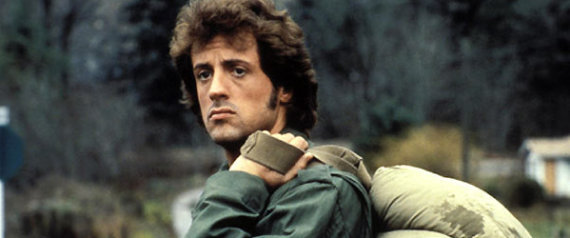
Maybe it has to do with Al Kasha and Joel Hirschhorn, who as a team won two Oscars for original ballads written for action movies in the 1970s – “We May Never Love Like This Again” from The Towering Inferno, and “The Morning After” from The Poseidon Adventure – though I think those were shoehorned into the movies and not played over the end credits.
Ben Adams: As a way of defining the scope of our discussion, I’d argue this trend has an obvious endpoint: Die Hard. It deliberately subverts this trope with the old school Christmas song over the end credits.
Die Hard was already such a strong misreading of 80s action movies that the song choice is a perfect punchline. I am sure there are some examples of the power ballad credits music in the post McClane era, but I think those were just dying gasps.
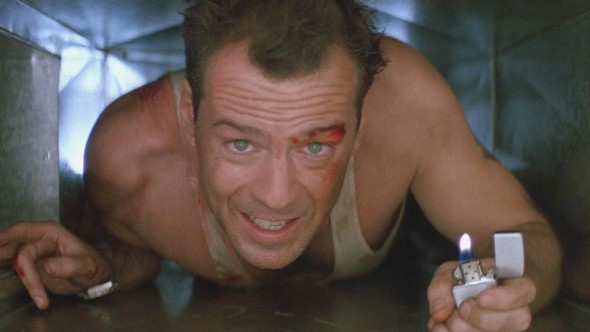
Stokes: And it’s a dead enough tradition that I once saw a very respectable academic claim that the tradition of putting an only-vaguely-connected ballad under the closing credits was new and revolutionary when Brokeback Mountain did it in 2005. She then asked if anyone could think of an earlier example… The only thing I could remember was Vanilla Ice’s “Ninja Rap.” And this was pivoting off of a very serious conversation about gay rights, and she was a very respectable academic. So I kept my mouth shut. “Anything before 2005?” she asked. “Come on, there’s gotta be a more serious example,” I thought, but I increasingly found myself unable to think of anything *other* than Ninja Rap.
“Jordan, you always talk about film music,” said another person in the room. “Can you think of one?” “Not, uh… Not really,” I said, (all the while thinking “Go ninja, Go ninja, GO!”).
Just then, a rooster crowed. And then I wept bitterly.
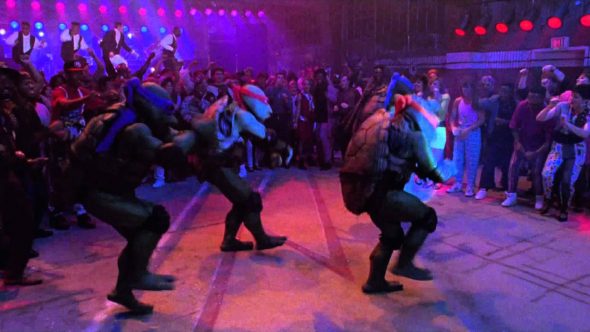
Fenzel: Have these people just forgotten that Bryan Adams exists?
But back to the original question, perhaps it’s as good a question to ask when action movies started playing up-tempo party music over the closing credits.
Because you’ve usually just watched a bunch of murder. So a ballad, intentionally or no, might connect it to a heteronormative idea of manhood and war – that after the killing if you win you get the woman. But finishing it up and going seamlessly into a New Jack Swing dance party doesn’t necessarily make more sense than going into a ballad.
This connects back to my old idea that the 80s of Stranger Things is distinctly pre-Beverly Hills Cop.
Take Batman Forever. You’ve got “Hold Me, Thrill Me, Kiss Me, Kill Me” and “Kiss from a Rose” to put over the end credits. Which do you put first?
Neither of them captures the tone of the movie, and they aren’t very similar to each other.
John: So is there a Likert scale for how related the tone of an end credits song should be to its subject matter? And what variable do we suspect governs how related it is – the decade in which it’s released? The subject matter?
As an interesting edge case: I remember that The Expendables, which was a deliberately atavistic 80s-style hyperviolent action thriller released in 2010, used “The Boys are Back in Town” as its end credits music. So the choice to be an homage to 80s action classics did not extend all the way through.
Ryan Sheely: We did some conceptual work on this over the summer, around the time when Ghostbusters came out. In the second of those two pieces, we proposed a continuum, but didn’t do a lot of work theorizing about what causes a given song to relate to the movie (we were focused on songs on movie soundtracks more generally, not just credits songs).
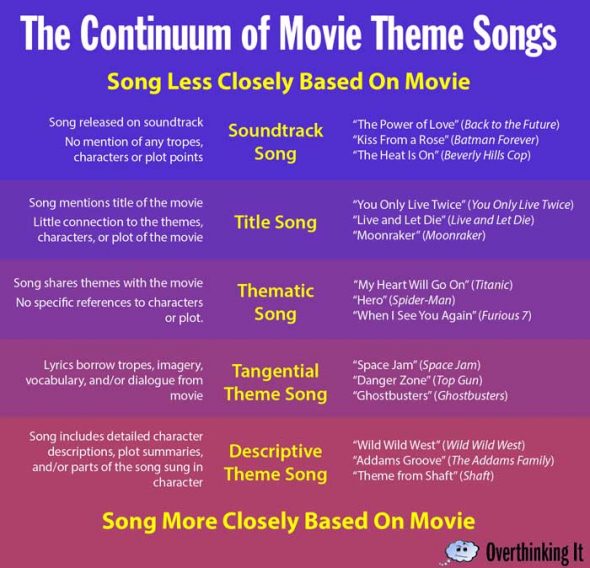
John: Ah yes! I hadn’t considered that because I was thinking tonally, not in terms of content. But yes, we have an existing continuum!
Sheely: But maybe what you were thinking is a slightly different axis? Or finer gradations of this axis?
John: Yeah, I think it may be a two-dimensional spectrum? Where tonal fidelity is on one axis and content fidelity is in another?
So “Peace in Our Life” scores 8 or 9 on the Content axis, because it’s about soldiers who just want to be loved by their country, just like Rambo: First Blood Part 2, but a 2 or 3 on the Tonal axis.
“TURTLE Power” scores about an 8.5 on both, losing only a few points because they get some of the Turtles wrong.
“Ghostbusters (Who Ya Gonna Call)” is of course a perfect 10 on both, as it is a clever and funky song about a clever and funky movie.
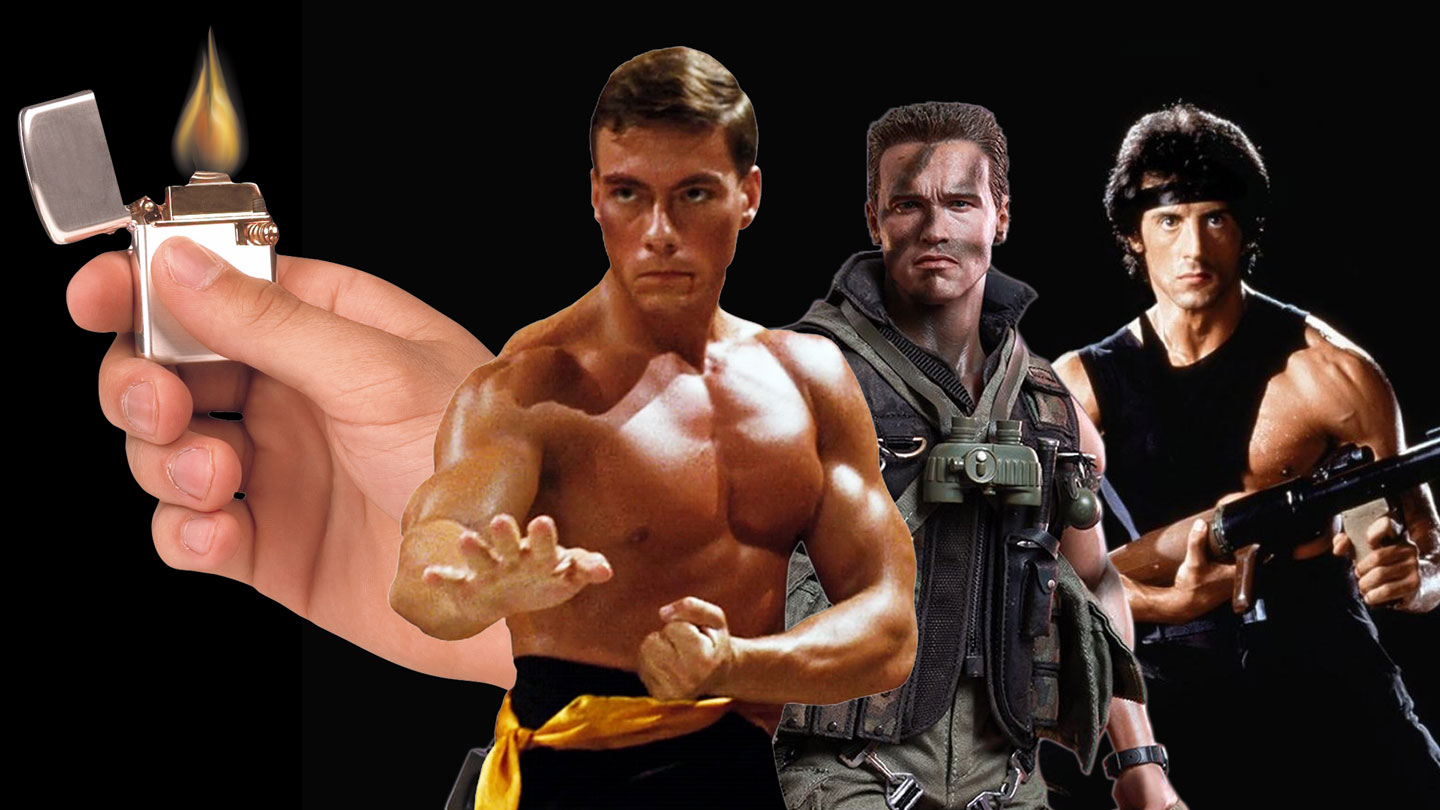
Add a Comment